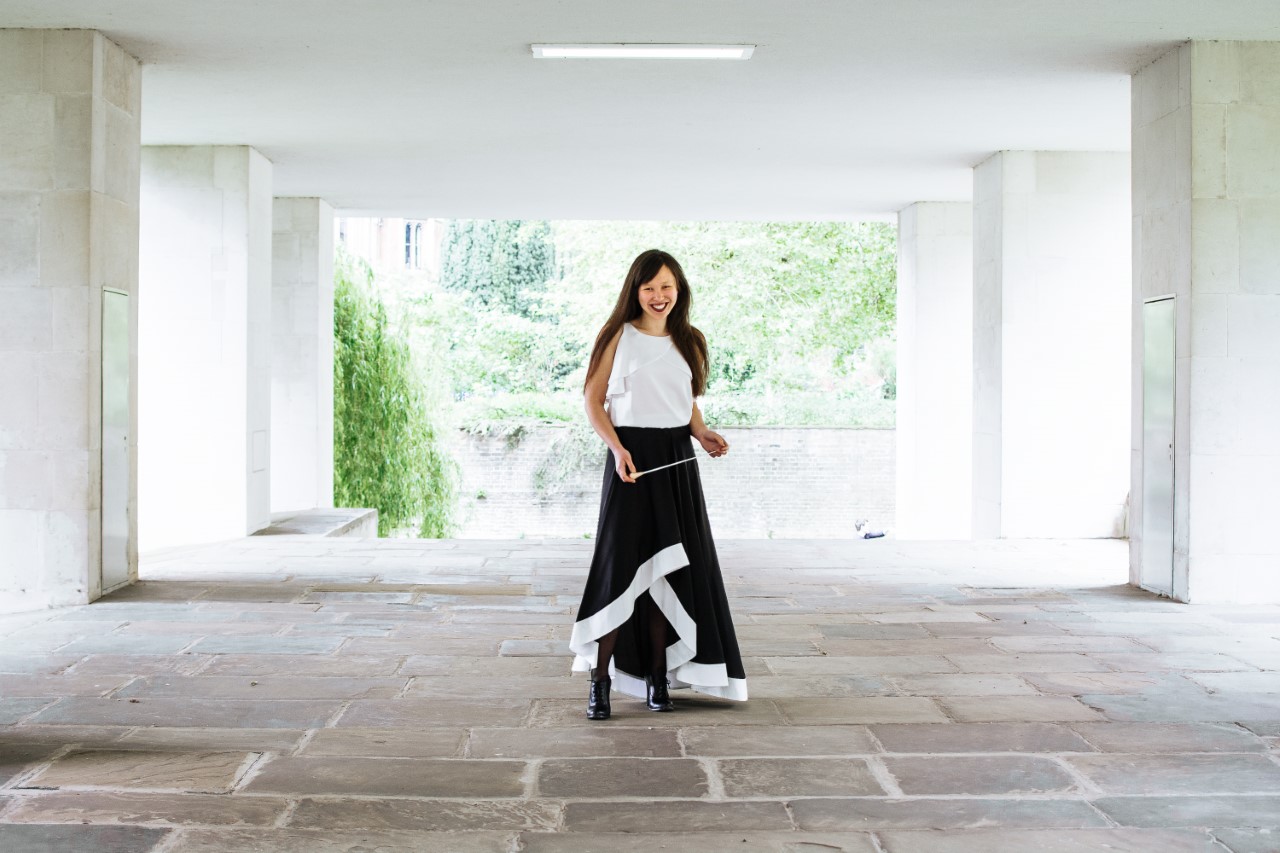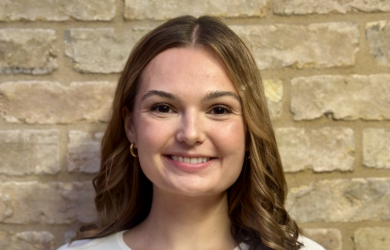
Naomi Woo on her research and career in music and why she is fascinated by the interaction between performer and audience.
I am interested in the connection between musicians and audience and in expanding the range of what people imagine a symphony orchestra is.
Naomi Woo
Eighteen months ago, after finishing her PhD, Naomi Woo [2014] moved to Winnipeg to take up the role of assistant conductor of the Winnipeg Symphony Orchestra.
The role is a first stepping stone to a career conducting orchestras in Canada and internationally. In this position, Naomi has conducted concerts for all audiences, but also had the opportunity to learn and grow as an assistant to music director Daniel Raiskin. An assistant conductor’s job is often to serve as the conductor’s ears in the hall, closely observing all rehearsals and performances.
Being a woman of Asian origin, Naomi doesn’t see many other professional conductors who look like her. However, as one of a growing number of women on the podium, she hopes she is able to expand people’s idea of who a conductor is. She also hopes to expand audiences’ perceptions of the orchestra in other ways. “I am interested in the connection between musicians and audience and in expanding the range of what people imagine a symphony orchestra is,” she says.
Naomi is also keen to expand the orchestra’s repertoire, for instance, during the Covid-19 pandemic, she produced and hosted a series of family concerts with the WSO called Manitoba Mosaic, whose goal was to explore the four seasons of the province of Manitoba through music and art. The show featured contributions from a young Indigenous artist, an Inuit throatboxer, local singer-songwriters, a tabla player and a musician playing the Chinese flute (dizi), among others. “I like working with children as their emotional response is so immediate,” she says.
Music education
In addition to reaching out to children, Naomi’s role involves a strong element of music education. She has two main education roles: one as music director of the University of Manitoba Symphony Orchestra; and the other as director of Sistema Winnipeg, which is inspired by the El Sistema programme in Venezuela and provides an intensive, free after-school programme aimed at assisting children in reaching their full potential and affecting social change through orchestral music training.
Winnipeg has a large Indigenous community and Naomi says that there is a responsibility on settlers to acknowledge the region’s long history prior to colonisation and to collaborate with the Indigenous communities that live there. She is taking university classes in Indigenous knowledge and is leading a core team at the Winnipeg Symphony Orchestra through a Change Network facilitated by Of/By/For All, focused on equity in arts and culture organisations.
“It’s not enough to say everyone is welcome,” she states. “There are things we have to unlearn and change in order to truly embrace everyone.” Her focus on anti-racist practice extends beyond her job, too; following the Black Lives Matter protests in Summer 2020, she has worked with Asian community members in Winnipeg in an effort to build solidarity with Black and Indigenous people, forming a collective called Prairie Asian Organisers.
Early music experience
Naomi was born in St John’s, Newfoundland, and it was there that she started piano lessons when she was five after badgering her parents. The family had a small piano which she loved to play, but her parents thought she was too young for lessons. Some friends who were musicians told them it was never too young to start and so she was signed up. When her family moved to North Vancouver, Naomi was six and she recalls how her piano teacher emphasised the importance of making all music expressive, even doing the scales. Naomi started playing duets with a friend and also with her siblings. She did frequent recitals at her teacher’s home. The focus was on sharing with other musicians and audiences.
Naomi also started learning the violin from the age of 10 with Joan Blackman, associate concertmaster with Vancouver Symphony Orchestra. “She held me to the highest standards. It helped me develop a strong appreciation for and understanding of the violin, even though I was never going to become a professional violinist,” says Naomi.
University
She played violin at university in Yale’s symphony orchestra which deepened her love for orchestral music and playing in a team. Naomi did her BA in Maths and Philosophy. She was not sure when she started what she wanted to do, but followed what interested her. Her BA was followed by a master’s in piano performance at Yale School of Music. It was there that she had her first conducting experience. She took an introduction to conducting course and applied successfully to be music director of the symphony orchestra, a post chosen by Yale students. “When I got up on the conductor’s podium for the first time I loved it,” she says.
As music director, she got to pick the programme and think about how it all fit together, about the composer’s context, about how she wanted to interpret the pieces and about the role an orchestra should play in society. “I have always been a curious person and I wanted to explore many different facets of life and music. It fits well into the role of conductor which uses so many parts of your brain. It’s very much not just about waving a baton,” she says.
When she finished her master’s Naomi applied to do an MPhil, and then a PhD in Musicology at Cambridge University. There she became a conducting fellow of the Cambridge University Musical Society and through that was mentored by conductor Sian Edwards, something she says was instrumental to developing her skills. She also did two masterclasses for women conductors – one in Cambridge and the other at the Royal Opera House. This involved 12 participants and 12 auditors [people who watch and listen]. “I had never before been in a room with 24 women conductors and mentors. Conducting can be a lonely profession and this helped me to feel part of a community,” says Naomi. She is still on a WhatsApp group with her fellow participants.
Naomi did an MPhil in Performance Studies which explored the intersection between performance and scholarship. She had the same supervisor, Professor John Rink, for both her master’s and her PhD, which she began in 2014, and says she was drawn “by the seriousness with which he acknowledges performance as a legitimate way of knowing and learning about music”.
Gates Cambridge Scholar
She really enjoyed being a Gates Cambridge Scholar and valued building a community outside her field. “Music can be solitary and insular. As a musician I don’t just perform for other musicians. I really value and need the interdisciplinary international community that Gates Cambridge represents,” she says.
Naomi’s PhD related back to her interest in maths and philosophy – she was fascinated by problems that are a paradox, ie they are neither true nor false. Her PhD was about the impossible – composers who challenge a performer to accomplish impossible tasks on stage or who write things that are paradoxical. “I am interested in things that elude our grasp. There is such magic in that,” says Naomi. “That’s what performance is about – it’s just beyond what we understand and that’s what makes it exciting. There are parallels with the kind of inspiration we need in the political and social world today.”
*Picture credit: Tom Porteous












